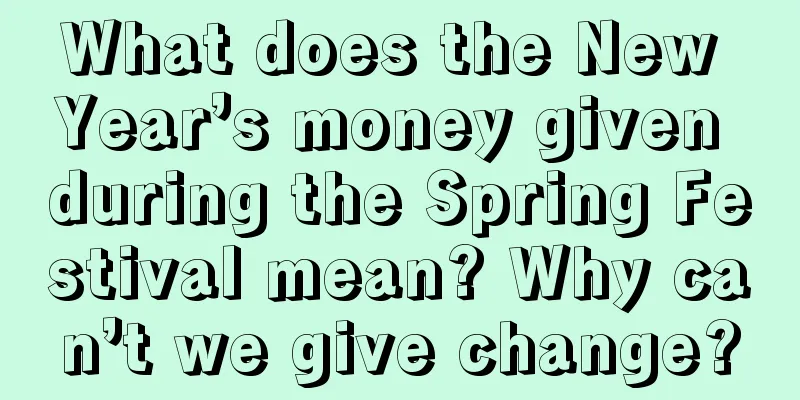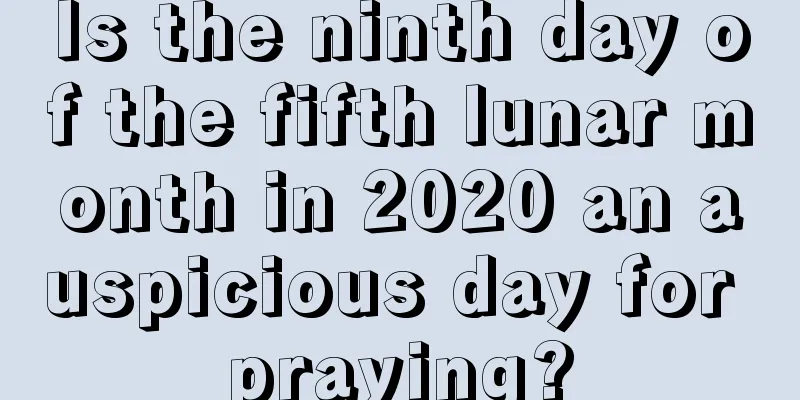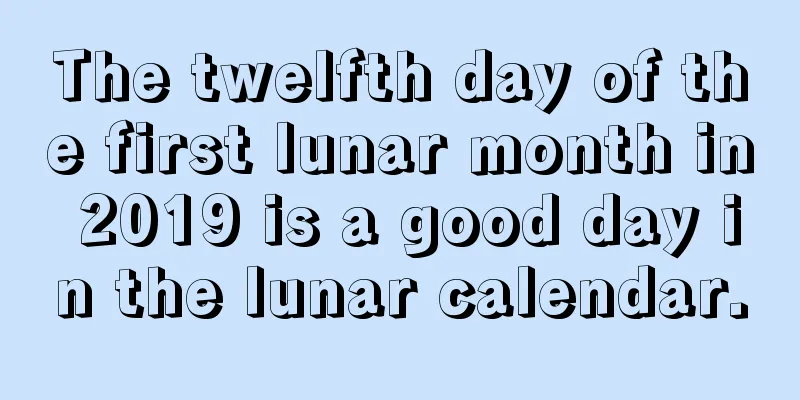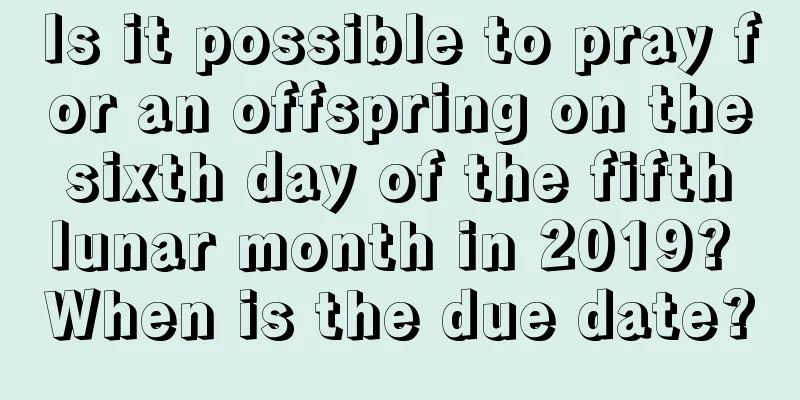What does the New Year’s money given during the Spring Festival mean? Why can’t we give change?

What does lucky money mean? Why can’t we give change? New Year's money is one of the customs of the Spring Festival. It is said that New Year's money can suppress evil spirits, and the younger generation can spend a year in peace after receiving New Year's money. Shuimoxiansheng.com provides you with more content related to the 2019 Chinese New Year. Everyone is welcome to learn about it together!What does lucky money mean? Why can’t we give change?New Year’s money is given to elders in the hope that they will live longer. The money given to children is called "suppressing evil spirits" and is given in the hope that the children will grow up safely. There is no set amount of money to give as New Year’s money, and you can give loose change. In folk culture, lucky money symbolizes warding off evil spirits and blessing peace. The original purpose of giving lucky money was to suppress evil and ward off evil spirits. Because people believe that children are easily harmed by evil spirits, they use New Year's money to ward off evil spirits. In the early days, New Year’s money was not given in the form of real money, but rather symbolic items like money, in the hope that it would serve as a deterrent. Later, people gradually strengthened the practical significance of New Year's money, and it became real currency. As the elders give cash to children during the Chinese New Year, it serves as pocket money for them to use in the new year.New Year's money in history:Han Dynasty: The earliest existing documented record of New Year's money appeared in the Han Dynasty. The earliest New Year's money was also called "Yansheng Money". This kind of money was specially cast in the shape of coins for the purpose of wearing and enjoying as a ward off evil spirits. The front of this kind of wearable item is engraved with the text on coins and various auspicious words, such as "Long Live the Lord", "Peace in the World", "Get Rid of Disasters and Eliminate Evil", etc.; the back is engraved with various patterns, such as dragons and phoenixes, turtles and snakes, Pisces, fighting swords, stars, etc.Tang Dynasty: The custom of giving out money in spring was popular in the palace. At that time, the Spring Festival was the "Start of Spring Day", a day for people in the palace to pay homage to each other. The 26th volume of "Zizhi Tongjian" records the fact that Yang Guifei gave birth to a son, and "Emperor Xuanzong went to see her in person, and was delighted and gave Guifei gold and silver money to wash the baby." The baby-washing money mentioned here has more important meaning than just congratulations. It is a talisman given by elders to the newborn to ward off evil spirits. Song and Yuan Dynasties: The first day of the first lunar month replaced the Beginning of Spring and was called the Spring Festival. The customs that originally belonged to the Beginning of Spring have also been moved to the Spring Festival. The custom of giving out money in spring evolved into the custom of giving children New Year's money. Fu Cha Dun Chong of the Qing Dynasty recorded the New Year's money in his "Yanjing Sui Shi Ji" as follows: "A piece of money is strung together with colorful strings, woven into a dragon shape and placed at the foot of the bed. This is called New Year's money. The money given by elders to children is also called New Year's money." Ming and Qing Dynasties: Most of the New Year’s money was given to children strung together with red strings. “Money strung together with colorful strings and woven into the shape of a dragon is called New Year’s money.” Therefore, in some places, giving children New Year’s money is called “stringing money.” During the Republic of China period, the elders would wrap 100 copper coins in red paper and give them to the younger generations as New Year's money, with the meaning of "long life". After the currency was changed to paper money, the elders liked to use new money with consecutive numbers as New Year's money, which meant continuous good luck and continuous promotion. New Year's money after the founding of New China:1950s: The currency system was changed, and New Year’s money was given in 5 cents or 1 cent increments. One had to kowtow and behave respectfully in order to receive it.1960s: At that time, the economic conditions of most families were very poor and they rarely saw sugar throughout the year. Using a few pieces of candy instead of "lucky money" makes both parents and children very sweet. 1970s: The economic situation was not very good in the early days, but "lucky money" was really money. Most children who kowtowed during the New Year could get five to ten yuan in lucky money. 1980s: The improvement of the country’s economic situation was proportional to the amount of New Year’s money. People in cities often give their children tens or hundreds of yuan, which they start to wrap up into "red envelopes" and give away. 1990s: New Year’s money was no longer a rare thing. You could get hundreds or thousands of yuan without doing anything, but you would have less money in your hands. Some was taken by your parents, some was deposited in the bank, and some was spent by yourself. After 2000: As economic conditions became better and better, the traditional meaning of New Year's money gradually changed. Adults gave out New Year's money to save face, and children also began to compete to see who got the most money. |
Recommend
Is the hexagram for March 23rd of the lunar calendar 2021 a good sign? Is it suitable for marriage?
March is also called Chenyue, Jichun, Peachyue, To...
The fate of boys born on the eighth day of the seventh lunar month in 2020
Different boys born at different times have differ...
Is it bad luck for those born at the hour of Mao on Father’s Day, June 16, 2019?
The most widely observed Father's Day date is ...
Can I pray on the 25th day of the sixth lunar month in 2019? Can pregnant women go to the temple to worship?
Introduction: Generally, you need to choose an aus...
Can I sign the contract on July 25th of the lunar calendar in 2018? What is the hexagram for today?
Signing a contract is a legal form of cooperation ...
What gifts are good for Christmas Eve? What are the meanings of giving different fruits?
As we all know, the day before Christmas is called...
Is it good to give birth to a boy on the seventh day of the twelfth lunar month in 2018? What are the auspicious and inauspicious days?
China's numerology culture is profound and ext...
What festival is on the eighth day of the first lunar month - February 1, 2020?
The first month of the new year is the beginning o...
What is the content of the lunar calendar for July 12, 2017? Is it suitable for travel?
Introduction: With the improvement and development...
Is it possible to pray for an offspring on the 26th day of the second lunar month in 2019? When is the due date?
Is it possible to pray for an offspring on the 26t...
In which year is the Mid-Autumn Festival and National Day on the same day? Is it a good idea to open the day before the Mid-Autumn Festival in 2020?
Introduction: There is Mid-Autumn Festival every y...
Lunar March 24, 2020: Good and bad luck for each hour
The lunar calendar is different for different day...
What is the fate of a boy born on April 24, 2021 in the lunar calendar? Is he blessed?
Those born in April are smart and talented. So wha...
Is it a good time to move house on the first day of the eleventh lunar month in 2020?
Is it a good time to move house on the first day ...
What is the exact time of the Beginning of Summer this year (2018)?
In ancient times, people divided each year into 24...









